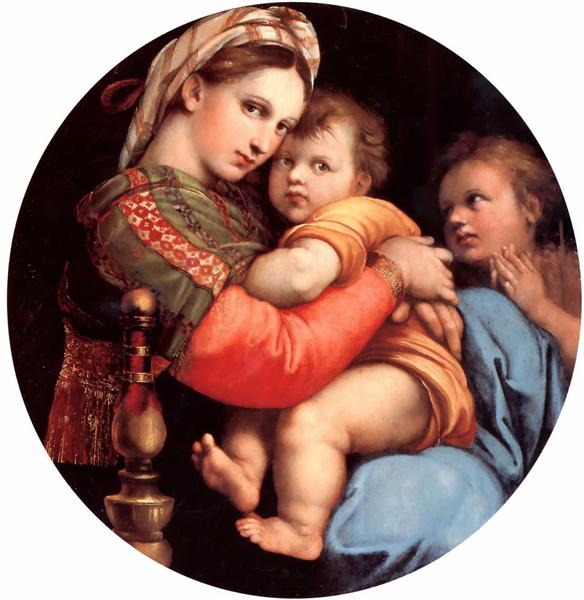Description
The Madonna of the Chair, painted by Raphael in 1515, is a work that embodies the essence of the Renaissance, fusing religious art with a deep sense of humanity and emotional warmth. In this visual icon, the central figure is the Virgin Mary, depicted in an intimate and tender moment with the Infant Jesus, who nestles in her lap. This intimacy is enhanced by the tilt of Mary's head, as she directs her loving gaze toward her son, establishing an emotional bond between the two that is palpable to the viewer.
The composition of the work is remarkable, particularly the way Raphael uses the curve of the chair as a central compositional element. This semicircular, padded structure not only frames the main characters, but also suggests an atmosphere of protection and shelter, where mother and child are sheltered in their own world. The choice of a chair instead of a conventional throne is also significant, as it suggests Mary's humanity and thus alludes to her role as a mother.
The use of colour is a distinctive feature of Raphael. The palette is made up of warm, soft tones that evoke a sense of peace and serenity. The blue of the Virgin's garment, symbolically associated with divinity and grace, contrasts effectively with the softer tones of the Christ Child's clothing. This contrast not only serves to highlight each figure, but also helps to structure the work visually. The choice of earthy colours and the subtle glow of gold tones in the details accentuate the area where the action takes place, drawing attention to the central figures.
In terms of technical aspects, Raphael demonstrates his mastery in the use of light and shadow. The soft lighting that bathes the figures brings a sense of three-dimensionality and realism that is characteristic of the Renaissance. This masterful use of chiaroscuro not only defines the forms, but also adds an almost sculptural element to the figures. The serene, contemplative expression of the Madonna and the innocent joy of the Child play a crucial role in encapsulating the central message of the work: motherhood and divinity intertwine in a moment of pure devotion.
This work is said to have been commissioned by an aristocratic family, but its legacy has transcended its original context, becoming a benchmark of religious art. The Madonna of the Chair is also notable for its influence on later painting, serving as an inspiration to artists who sought to capture the essence of maternal love. Looking at the work, one can recognize influences from Byzantine iconography, which underlines the place of the Virgin Mary as a mediator in the Christian tradition, while preserving the humanity that characterizes Raphael's work.
As we delve deeper into this painting, it becomes clear that The Madonna of the Chair is not simply a depiction of the Blessed Virgin, but a testament to Raphael's talent for combining spirituality with human warmth. The work, in its beauty and simplicity, invites us to contemplate not only the figure of Mary, but also the depth of maternal love and its transcendent meaning. This painting remains one of Raphael's most beloved, a splendid example of art's ability to communicate universal emotions across time.
KUADROS ©, a famous painting on your wall.
Hand-made oil painting reproductions, with the quality of professional artists and the distinctive seal of KUADROS ©.
Painting reproduction service with satisfaction guarantee. If you are not completely satisfied with the replica of your painting, we will refund 100% of your money.

